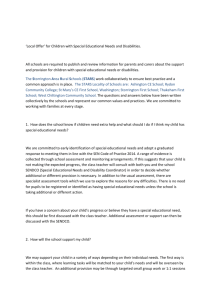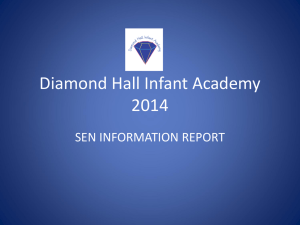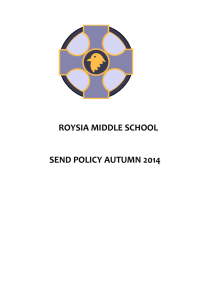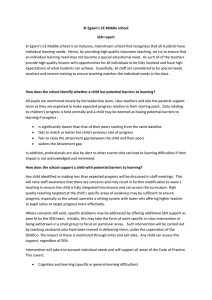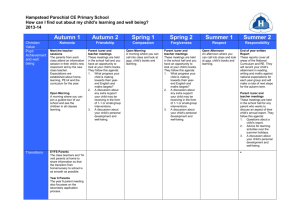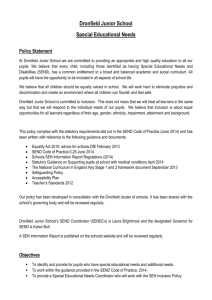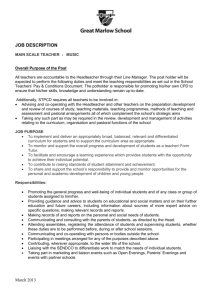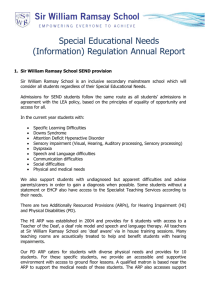SEN-Special Educational Needs Policy
advertisement
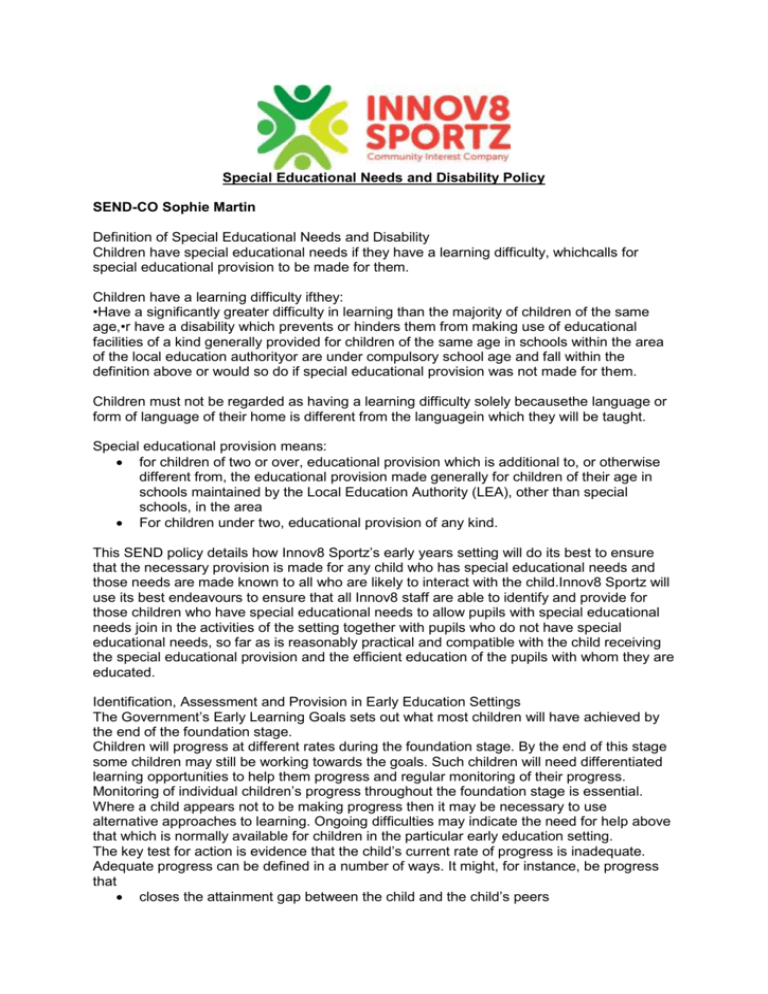
Special Educational Needs and Disability Policy SEND-CO Sophie Martin Definition of Special Educational Needs and Disability Children have special educational needs if they have a learning difficulty, whichcalls for special educational provision to be made for them. Children have a learning difficulty ifthey: •Have a significantly greater difficulty in learning than the majority of children of the same age,•r have a disability which prevents or hinders them from making use of educational facilities of a kind generally provided for children of the same age in schools within the area of the local education authorityor are under compulsory school age and fall within the definition above or would so do if special educational provision was not made for them. Children must not be regarded as having a learning difficulty solely becausethe language or form of language of their home is different from the languagein which they will be taught. Special educational provision means: for children of two or over, educational provision which is additional to, or otherwise different from, the educational provision made generally for children of their age in schools maintained by the Local Education Authority (LEA), other than special schools, in the area For children under two, educational provision of any kind. This SEND policy details how Innov8 Sportz’s early years setting will do its best to ensure that the necessary provision is made for any child who has special educational needs and those needs are made known to all who are likely to interact with the child.Innov8 Sportz will use its best endeavours to ensure that all Innov8 staff are able to identify and provide for those children who have special educational needs to allow pupils with special educational needs join in the activities of the setting together with pupils who do not have special educational needs, so far as is reasonably practical and compatible with the child receiving the special educational provision and the efficient education of the pupils with whom they are educated. Identification, Assessment and Provision in Early Education Settings The Government’s Early Learning Goals sets out what most children will have achieved by the end of the foundation stage. Children will progress at different rates during the foundation stage. By the end of this stage some children may still be working towards the goals. Such children will need differentiated learning opportunities to help them progress and regular monitoring of their progress. Monitoring of individual children’s progress throughout the foundation stage is essential. Where a child appears not to be making progress then it may be necessary to use alternative approaches to learning. Ongoing difficulties may indicate the need for help above that which is normally available for children in the particular early education setting. The key test for action is evidence that the child’s current rate of progress is inadequate. Adequate progress can be defined in a number of ways. It might, for instance, be progress that closes the attainment gap between the child and the child’s peers prevents the attainment gap growing wider is similar to that of peers starting from the same attainment baseline, but less than that of the majority of peers matches or betters the child’s previous rate of progress ensures access to the full curriculum demonstrates an improvement in self-help, social or personal skills Demonstratesimprovements in the Child’s behaviour. Once practitioners have identified that a child has special educational needs, Innov8 Sportz Special Education Needs Co-Ordinator (SENDCO) Sophie Martin will intervene througha my support plan. If this intervention does not enable the child to make satisfactory progress the SENDCO may need to seek advice and support from external agencies. Thisform of intervention is referred to as Intervention from another agency Informing parents to contribute their knowledge and understanding of their child and raise any concerns they may have about their child’s needs and the provision that is being made for them, is an essential initial step. Role of the SENDCO In Innov8 Sportz Early Years setting the SENDCO has responsibility for: •ensuring liaison with parents and other professionals in respect of children with special educational needs advising and supporting other practitioners in the setting ensuring that appropriate Individual Education Plans are in place ensuring that relevant background information about individual children withspecial educational needs are collected, recorded and updated. The SENDCO will take the lead in further assessment of the child’s particular strengths and weaknesses; in planning future support for the child in discussion with colleagues; and in monitoring and subsequently reviewing the action taken. The SENDCO will also ensure that appropriate records are kept including a record of children using a my support planand those using a my plan. The key worker of the child will be usually responsible for working with the child on a daily basis and for planning and delivering an individualised programme. Special Educational Needs and Disability Code of Practice. The new Code suggests the setting SENDCO should be involved in assessing previous information, assessment, informing staff and parents of action, reviewing and monitoring all children with SEND, new entrants to the Innov8 Sportz, those using a My plan or a My support plan. This Policy was approved by the Innov8 Sportz C.I.C Board June 2014, was reviewed August 2015 and is due for further review August 2016.
